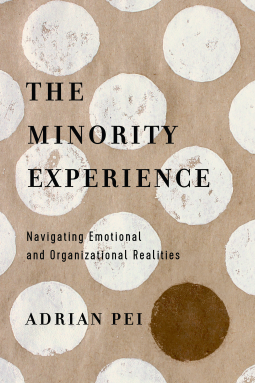
The Minority Experience
Navigating Emotional and Organizational Realities
by Adrian Pei
This title was previously available on NetGalley and is now archived.
Send NetGalley books directly to your Kindle or Kindle app
1
To read on a Kindle or Kindle app, please add kindle@netgalley.com as an approved email address to receive files in your Amazon account. Click here for step-by-step instructions.
2
Also find your Kindle email address within your Amazon account, and enter it here.
Pub Date Sep 04 2018 | Archive Date Oct 16 2018
InterVarsity Press | IVP
Talking about this book? Use #TheMinorityExperience #NetGalley. More hashtag tips!
Description
It's hard to be in the minority.If you're the only person from your ethnic or cultural background in your organization or team, you probably know what it's like to be misunderstood or marginalized. You might find yourself inadvertently overlooked or actively silenced. Even when a work environment is not blatantly racist or hostile, people of color often struggle to thrive—and may end up leaving the organization.Being a minority is not just about numbers. It's about understanding pain, power, and the impact of the past. Organizational consultant Adrian Pei describes key challenges ethnic minorities face in majority-culture organizations. He unpacks how historical forces shape contemporary realities, and what both minority and majority cultures need to know in order to work together fruitfully. If you're a cultural minority working in a majority culture organization, or if you're a majority culture supervisor of people from other backgrounds, learn the dynamics at work. And be encouraged that you can help make things better so that all can flourish.
Advance Praise
"Insightful, practical, honest, and kind hearted, The Minority Experience is an enormously insightful book. I don't know of another book that so clearly illuminates the experience of ethnic minorities in majority culture organizations. I was challenged and encouraged by Adrian Pei's thoughts and, more than that, felt hope for the future of my own organization—highly recommended."
-Matt Mikalatos, author of Good News for a Change and Sky Lantern
"Some books add to a conversation and some books move a conversation forward. The Minority Experience is the latter. I've been looking for a book that adds this perspective to the church's conversation on race as well as offers practical steps for making significant change to power structures and organizations. Adrian Pei's tightly written and persuasive book should be required reading for leaders and teams looking to build healthier cultures and jump ahead in one of the most significant conversations facing society today. I can't recommend it enough."
-Ken Wytsma, author of The Myth of Equality, lead pastor of Village Church in Beaverton, Oregon
"Rooted in specific stories and practical examples, this book is a must-read for any culturally competent organization. Adrian provides clear and vulnerable insight into the experience of ethnic minorities in many dominant-culture–led organizations. His framework of Pain, Power, and Past provides a solid foundation for understanding and will help communities avoid many common mistakes."
-Sandra Maria Van Opstal, author of The Next Worship
"The Minority Experience: Navigating Emotional and Organizational Realities was a pleasure to read because I not only gained new insight from a well-researched and well-written book, but I learned things about myself I did not know. Adrian Pei has given us fresh insight into the issues surrounding race and ethnicity; let's accept it as he moves us farther down the road to healing."
-Randy Woodley, author of Shalom and the Community of Creation: An Indigenous Vision
"The Minority Experience is a helpful addition for organizational leaders to grow and deepen their cultural intelligence to include race and ethnicity. Author Adrian Pei draws from his own ethnic identity journey, which pushes his understanding of leadership and faith, and graciously tells the story of organizational failures and opportunities."
-Kathy Khang, author of Raise Your Voice
"Adrian Pei wonderfully exposits, via stories and quantitative data, a missing piece of the conversation in today's tense national racial divide. This is absolutely necessary reading for those in the majority who may not understand what it's like to be a minority as well as for minorities who have struggled to put into words what they've been feeling. It is for leaders of organizations and for anyone who calls themself a Christian. This is a book I wish I had written! Not only do we share the Asian American experience, but I am a Cru alum as well. Pei blends faith, practice, and theory together into a beautiful, eye-opening tapestry."
-Allen Yeh, associate professor of intercultural studies and missiology at Biola University
"Without oversimplification, Adrian Pei articulates much-needed clarity, framing, and direction for those seeking to lead organizations with cultural intelligence. Adrian's vulnerability in his self-reflection captures the minority experience in a way that few other books are able to do. The Minority Experience is honest with its reflections, thoughtful in its approach, and filled with practical hope for shaping a new tomorrow."
-Charles Lee, CEO at Ideation, author of Good Idea. Now What?
Available Editions
| EDITION | Other Format |
| ISBN | 9780830845484 |
| PRICE | $20.99 (USD) |
Links
Average rating from 3 members
Featured Reviews
 Adam S, Reviewer
Adam S, Reviewer
Takeaway: If Christians want to reflect the diversity of the kingdom, then organizations have to acknowledge the reality of the minority experience and make changes.
Books on race or history around race or even race within the Christian world are not new, but there are few books within the Christian community that are particularly focused on minorities within the predominately White parachurch world. The only other book that is somewhat similar to Adrian Pei’s The Minority Experience that I have read is the book edited by Anthony Bradley, Aliens in the Promised Land. However, these are two very different types of books.
Aliens in the Promised Land was an account by a number of Christians working in predominately White church or church based organizations, many of them educational institutions. That first person account from a number of different people, of different racial or ethnic backgrounds and working in different types of organizations, lays the groundwork for why White Christians need to be listening to minorities within predominately White church. But by its nature, the book is more focused on personal description than larger systemic issues. Adrian Pei’s The Minority Experience includes personal examples and memoir, but the focus is organizational development..
I have entirely too many highlights and notes to adequately trace all of the themes that Pei develops through the book, but I want to note four that were particularly striking to me.
First, Pei is focusing on systems because he is focused on organizational development. It is not that personal ignorance or animus are unimportant when talking about the minority experience within organizations, but “Systematic power is often hardest for people to accept or understand, because it is largely invisible. Also, it is far easier to blame an individual than a system because a system doesn’t have as clear a culprit and solution.” (Kindle Location 550)
Pei also clearly outlines the difference between segregation and separation. “Segregation is an act of power imposed upon a minority group against their will, not a voluntary attempt to form a community of support.” (Kindle Location 520) One of the trends in discussion around racial and ethnic issues is that many Whites point to separation as a form of racism without understand the difference between preventing minorities from participation and the gathering together of minorities for support.
The third major thread that I think is really important to the book is why diversity matters, both within culture and within organizations.
“The inherent message that has settled into the group—is that it can succeed and be secure with its current demographic. That is why so many minorities believe that diversity is treated as optional. It the most blunt and pragmatic sense, diversity is optional to many white organizations, because their historical success has not relied on it.” (Kindle Location 1060)
Many Christian organizations have come to understand that diversity really is an important feature of the kingdom. But too many seem to value ‘Cosmetic diversity’, valuing visual diversity by promoting the voices of minorities that are most able or willing to reflect White cultural values. Viewing minorities as primarily transactional (what we can learn or gain by having minorities in our organization) is different from valuing people that are created in the image of God and whom are part of the diverse reality of the kingdom.
Finally there is a long section on the importance of pain, power, and the past, not just for minorities, but for leaders.
“…as I thought about the themes of pain, power, and the past, I realized this: Leaders who are in touch with pain…can see and serve people with compassion. Leaders who are in touch with power…can be incredible advocates for the most vulnerable in society. Leaders who are in touch with the past…can teach and guide others with great humility and wisdom. In another way of putting it: Pain builds compassion. Power builds advocacy. The past builds wisdom.” (Kindle Location 1077)
As I touched on with my thoughts on Flannery O’Connor, but worked out in more detail in a discussion on Facebook, how we look at heroes and history matters to how we think about Christian development today. It wasn’t until I started looking at my notes that on The Minority experience that I realized I had internalized this piece of advice without attributing it. Pei quotes Soong-Rah Chan as saying, “American culture tends to hide the stories of guilt and shame and seeks to elevate stories of success. American culture gravitates toward narratives of exceptionalism and triumphalism, which results in amnesia about a tainted history.” (Kindle location 1091)
Part of what is important in The Minority Experience is a focus on rightly grappling with history and experience so that we can rightly understand what it means to be a Christian. If we think of Christianity through the lens of hagiography of the saints, we will have a distorted understanding of what faithfulness looks like as a Christian. This is true for both Christians as individuals and systems that Christians work and worship in. It may be particularly important today, as we are facing organizational crises brought on by abusive power and sexual abuse and cover-up, that we rightly tell ourselves truthful stories of our past.
If our organizational stories and mythology is only about greatness, and not about mistakes, then we will not learn about the history of overcoming that is part of the natural reality of an organic system. People and systems are both corrupted by sin, and inherently limited by their creation. We as individuals were not created with unlimited potential, we were created with limited potential (although in God’s image so with inherent value and dignity.) Organizations are similarly limited because they are made up of humans. The best intentioned organizations will make mistakes and will harm people, even if only unintentionally. Without learning to see that pain and accurate history organizationally, the system cannot adequately deal with it and heal.
Richard Beck on his blog posted about the helpfulness of thinking about sin, not just as ‘missing the mark’ but also through the metaphor of sickness or disease. Sin impacts relationships. The pithy wisdom, ‘hurt people, hurt people’, means that we cannot just cut people off organizationally to become more healthy. We also have to work at healing ruptured relationships to produce stronger bonds.
I have already ordered three copies of this to give to friends. There are no silver bullets in the world, but books like The Minority Experience can be helpful to give a lens to areas of growth.
(A digital copy of the book was provided free by the publisher for review.)





